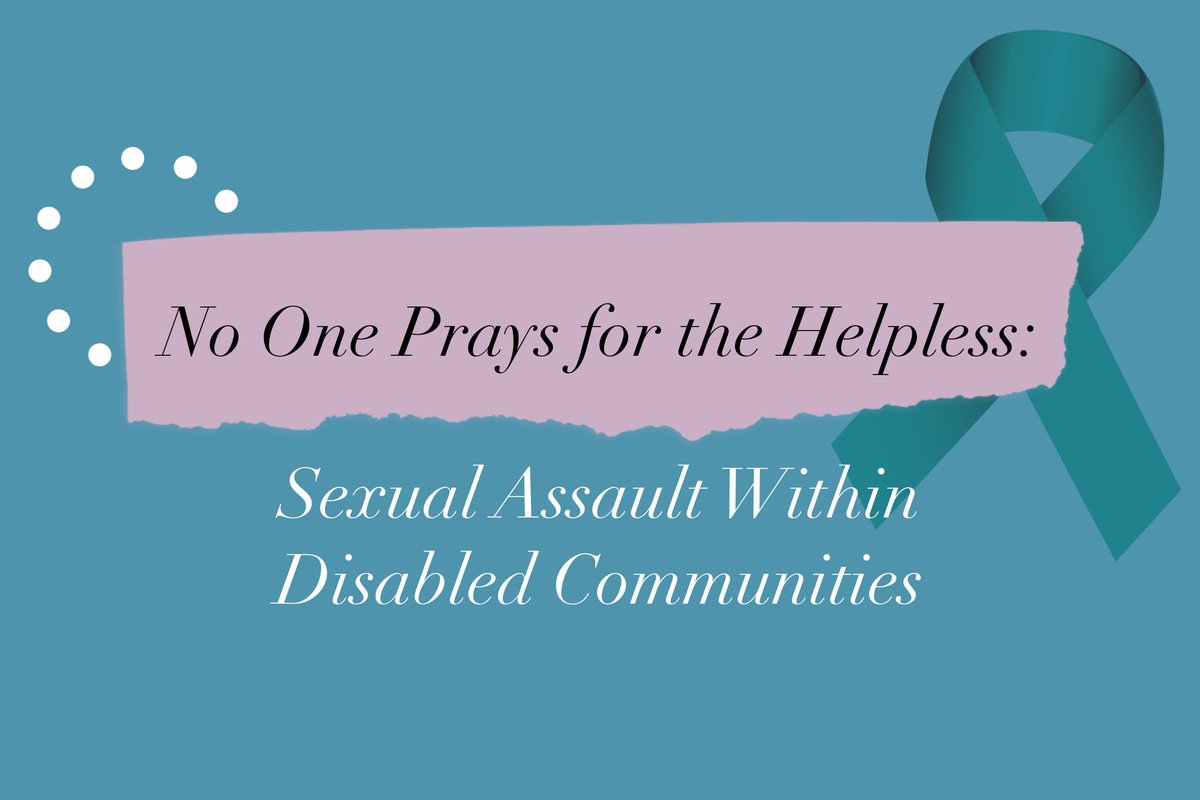sexual assault within disabled communities: a thread by the big sister of a girl with autism spectrum disorder
Sexual assault is defined as “Illegal sexual contact that usually involves forced upon a person without consent or is inflicted upon a person who is in capable of giving consent (because of age or physical or mental incapacity) or who places the assailant in a position of trust.
While the very definition of sexual assault acknowledges the occurrence of disabled individuals regularly being victims of sexual assault, they are rarely, if ever, included in national dialogues that address such issues.
According to NPR & unpublished Justice Department data on sex crimes, people with intellectual disabilities are 7 times more likely to be victims of sexual assault than people without disabilities.
However, this data excludes the 300,000+ people who live in group homes & state-run institutions; meaning the actual number of sexual abuse & violence cases that unfortunately occur in these environments are likely higher than the numbers presented by the Justice Department.
The fact that individuals who live in assisted living & government-funded institutions are excluded from this statistic calculation conveys 2 messages: they are not “human enough” to be protected, and disability representation continues to be compromised by those with authority.
Lack of awareness and support for disabled communities, especially with regards to their protection from sexual abuse/abusers, is perpetuated by the incorrect assumption in thinking sexual assault cannot happen to those who are disabled.
A diagnosis of a disability is often accompanied by the desexualization of that individual; the thought of someone sexualizing or “going after” them in that sense is completely ruled out, which makes the idea of sexual assault happening to them seem like an impossibility.
When one’s sexuality is stripped away, so is a key humanizing factor of their existence. This then perpetuates the aforementioned idea that sexual assault can only happen to the able bodied & minded, when in reality, disabilities can make individuals more vulnerable than ever.
Such crimes often go unreported, & unpunished, for several reasons, but the main 2 being the fact that the attacks are often carried out by people the victims trust, as well as law enforcement discrediting victims’ testimonies & claims when they are able to & do come forward.
Testimony taken from & claims by disabled individuals are often, if not always, disregarded by law enforcement when being considered for use in a case. It is often claimed that verbal evidence from disabled victims is not valid, tracing such reasoning back to cognitive barriers.
Caretakers, vehicle operators, close family and friends (people whom the victims regularly trust) are often the same people who are the victim’s abuser. The victim’s silence is preserved because of this, as well as because of caretakers being their “voice” when questions arise.
Aside from the obvious physical trauma victims suffer, the mental & emotional pain left behind is not only evident in disabled victims too, but is also amplified by expressive & communicative barriers that may prevent timely & effective healing, if any healing occurs at all.
Disabled victims often cannot comprehend that what happened to them was wrong, as abusers normalize their behavior & make victims feel as though they either “deserve it” or that such actions are commonplace. Victims trust those who are meant to care for them, so abuse continues.
As the national dialogue about the pervasiveness of sexual assault grows nearly every single day, it is vital that we begin to include disabled communities in that conversation as well. All sources are cited in the paper on this thread is based.
From one big sibling to another, thank you  https://abs.twimg.com/emoji/v2/... draggable="false" alt="❤️" title="Red heart" aria-label="Emoji: Red heart"> #autism #AutismAwareness #MeToo
https://abs.twimg.com/emoji/v2/... draggable="false" alt="❤️" title="Red heart" aria-label="Emoji: Red heart"> #autism #AutismAwareness #MeToo  https://abs.twimg.com/hashflags... draggable="false" alt="">
https://abs.twimg.com/hashflags... draggable="false" alt="">

 Read on Twitter
Read on Twitter


